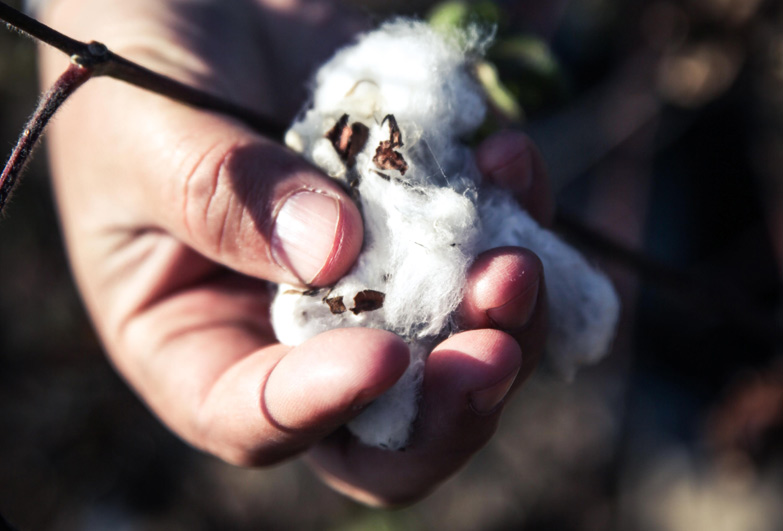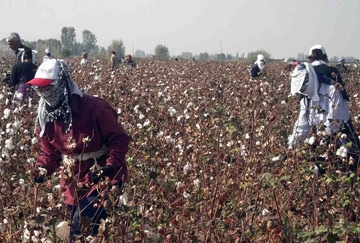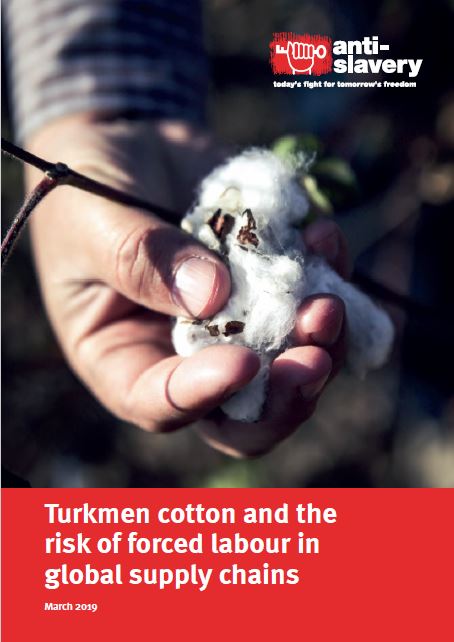Turkmenistan uses Turkey as a gateway for its forced labour affected cotton to enter global supply chains – Rocio Domingo Ramos on our latest research.

5 April 2019
Does your business source cotton products from Turkey? Or maybe you have been buying clothes with ‘Made in Turkey’ tag? I have bad news for you: you may be inadvertently supporting a large scale system of forced labour.
You can be forgiven for not being aware of it, because Turkmenistan – which we’re talking about here – very rarely, if ever, hits the news headlines. But with over 300 million dollars’ worth of cotton and textile exported to Turkey every year, it uses Turkey as the main gateway for its cotton products to the global supply chains.
Anti-Slavery International has released a new report bringing those the strong links between Turkey and Turkmenistan to light.
Turkmenistan’s cotton crimes
Every year during the cotton harvest season, the Turkmen government sends thousands of citizens into the cotton fields against their will. Doctors, dentists, teachers, students and military personnel are some of the people who are forced to abandon their regular jobs in order to toil under hazardous conditions in the fields for days on end.
This system of forced labour, a legacy of past soviet practices, is built on threat of punishment and intimidation. Workers refusing to pick cotton face the risk of having salary deductions, losing their jobs, or other punishment that is part of everyday life in this one of the world’s most repressive regimes.
“If you refuse to go away cotton picking or have a good reason not to be away from home for 10 days, your boss will just say, ‘You Know where the door is’.”
– A worker at the Maryagyzsuv water supply company sent to pick cotton during the harvest season, 2018.
Cotton picking is an arduous work. Conditions in the fields are very poor and people have only limited access to fresh drinking water. Those workers assigned to remote areas have to stay overnight with no option but to stay in squalid and unsanitary conditions.
“It was dark and empty and had bare earth instead of a floor with a few tatty felt mats laid out. […] Our group of cotton pickers had to get by on their own food for two weeks. […] There was no shower at all and no toilet for probably five kilometres.”
– A worker at Dashoguz vegetable oil mill sent to pick cotton during the harvest season, 2018.
Risks of Turkmen forced labour cotton in global supply chains
Being the 11th largest cotton producer in the world, not only does the country hold an important position on the global market for raw cotton, but it also has significant cotton processing facilities covering the whole textile production cycle. Turkmenistan’s apparel and textile exports pose a significant risk of forced labour tainting global supply chains and present a challenge to brands’ due diligence.
Turkey and Turkmenistan have special political, economic and business relationships, which leads to a higher presence of Turkmen cotton within Turkey. Through Turkey’s investment in Turkmenistan’s textile industry, Turkish suppliers are playing an important role in upholding forced labour practices. Once in Turkey, textile products containing Turkmen cotton find their way through global markets and end up being sold in high street shops across the world.
Anti-Slavery has documented cases of Turkish enterprises that operate in Turkmenistan, some with huge production capacities. Calik Holding, for example, is a large Turkish holding company with activities in the garment and textile industry, which owns production plants located in Turkmenistan and claims to sell their products to well-known international brands.
What can brands do?
Due to the nature of the cotton production system in Turkmenistan, which is based around state-sponsored forced labour, we urge brands to stop sourcing cotton from Turkmenistan and to undertake the following steps.
- Stop sourcing cotton from Turkmenistan. We invite brands to publicly oppose the use of Turkmen cotton in their supply chains, for example by signing the Turkmen Cotton Pledge, to demonstrate to the Turkmen government that human rights violations in cotton production are unacceptable.
- Raise awareness. Inform consumers about the labour abuses that might affect the products they wear and use every day.
- Engage Turkish suppliers. We don’t want brands to boycott Turkish companies, as it may inadvertently affect those that don’t source Turkmen cotton, and some might even not be aware of the issue. Instead, we want brands to collaborate with their Turkish suppliers and put the issue of Turkmen cotton on their agenda.
- Join in on putting pressure on the Government of Turkmenistan. We are calling on brands to use their power to get involved and to raise their concerns to the Turkmen government.

Does your business need help?
Anti-Slavery can help to identify risks of slavery in your supply chains and support you to addres them
What can consumers do?
Let the brands know that accepting the risks of forced labour practices – even if little known – in their supply chains is unacceptable. Let them know that you as their customer expect more from them to ensure that the products you buy are slavery free. The easiest way to do it is to send the below tweet asking a brand to sign up to the Turkmen Cotton Pledge and implement its commitments.
Together, we can end Turkmen Cotton Crimes for good.
Tweet to your favourite brand:
#Forcedlabour is rife in Turkmenistan and affects global cotton supply chains. @[brand handle] please sign up to the Turkmen Cotton Pledge to ensure it doesn’t taint the products I buy from you. https://www.sourcingnetwork.org/turkmen-cotton-pledge/
Read the Turkmen cotton and the risk of forced labour in global supply chains in a PDF format:
